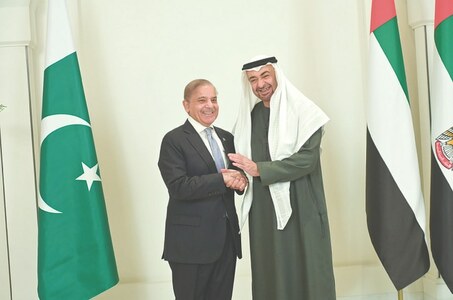ISLAMABAD, April 4: The Supreme Court on Monday commenced hearing on constitutional petitions challenging the 17th Constitutional amendment and the dual office of President Pervez Musharraf. Advocate A. K. Dogar of the Pakistan Lawyers Forum, who has challenged the vires of the 7th Amendment, the dual office of the president and the Legal Framework Order, pleaded before a five-member larger bench to hold President Musharraf guilty of high treason under Article 6 (high treason) of the constitution for overthrowing a democratically elected government.
The Supreme Court enjoyed the authority to directly invoke such powers despite the fact that the article relating to treason could only be initiated on a reference from the president, he argued.
“I have no enmity with any general but serious view should be taken whenever constitution is violated,” he said, adding that only two military governments in the world still existed, in Pakistan and Burma.
The larger bench, specially constituted to hear a total of seven constitutional petitions that have been pending before the court for some time, comprised Chief Justice Nazim Hussain Siddiqui, Justice Iftikhar Mohammad Chaudhry, Justice Javed Iqbal, Justice Abdul Hameed Dogar and Justice Faqir Mohammad Khokhar.
The federal government, in line with earlier direction of the Supreme Court to submit comments on these petitions within three weeks, has already filed its replies. The Supreme Court while issuing this direction had also summoned the attorney general as well as the advocates general of the four provinces.
In his arguments on Monday, Mr Dogar opposed the concept of the doctrine of necessity again invoked in the Zafar Ali Shah case, under which the October 12, 1999 military takeover was validated and a three-year extension was given to the Musharraf government.
Mr Dogar cited the Wasim Sajjad case to state that this concept (doctrine of necessity) was contrary to Article 2-A (Objective Resolution to form part of the substantive provisions) of the constitution under which people could only be governed by the chosen representatives.
He said the April 9, 2002 referendum was also a clear “subversion” as it was against the Zafar Ali Shah case in which the apex court had ordered not to touch the parliamentary form of government.
Though the Supreme Court in the Qazi Hussain petition, challenging the referendum, had held that Pervez Musharraf’s referendum would not have the affect of amending the constitution, the August 21, 2002 LFO virtually amended it, he said.
Mr Dogar will resume his arguments on Tuesday.
After Mr Dogar, Maulvi Iqbal Haider, Chairman Awami Himayat Tehrik Party, who in his petition has favoured the president’s decision of holding two offices, will initiate arguments while Barrister Zafarullah Khan of the Watan Party will start arguments against the holding of the two offices by the president.
Petitioner Engineer Jamil Ahmed Malik of the Pakistan Communist Party had criticized the assent given to the dual office bill by the acting president.












































Dear visitor, the comments section is undergoing an overhaul and will return soon.